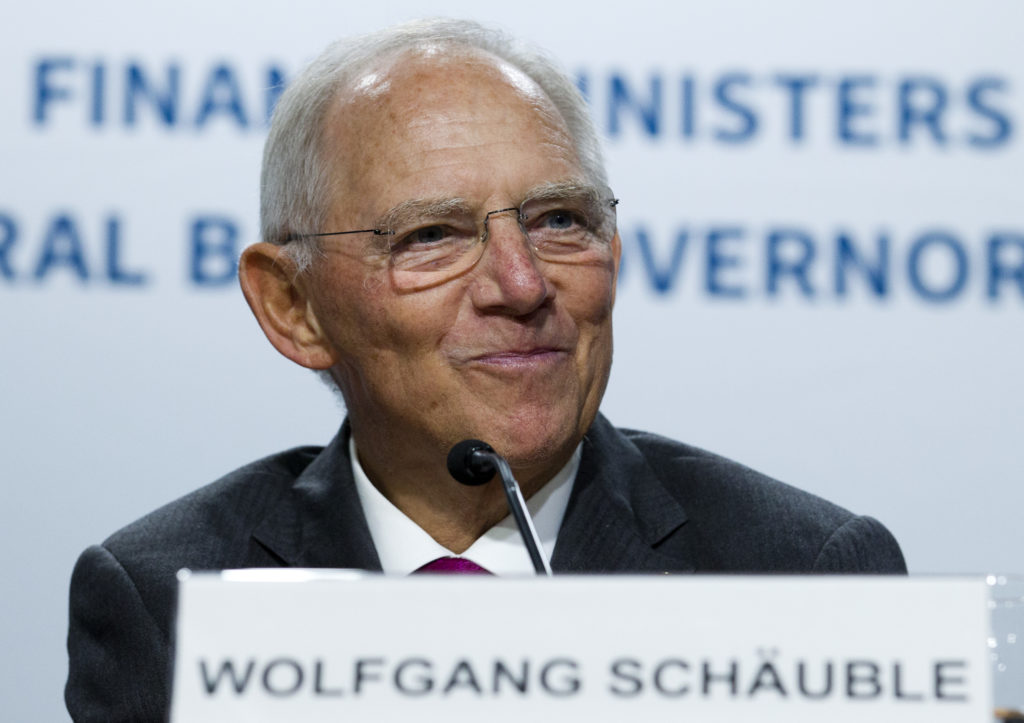
Germany Finance Minister Wolfgang Schäuble speaks during a news conference, after the G20 finance ministers and central bank governors meeting, on the sidelines of the World Bank/IMF Annual Meetings in Washington, Friday, Oct. 13, 2017. ( AP Photo/Jose Luis Magana)
WASHINGTON — Global finance officials on Friday defended their efforts to promote free trade and closer international links against a rising ride of populism around the world and criticism from a Trump administration intent on pursuing its “America First” agenda.
Finance ministers from the world’s major economies wrapped up two days of talks with German Finance Minister Wolfang Schaeuble saying that the G-20’s efforts represented a solid response to unhappiness over globalization.
Schaeuble said a year ago people were talking about the “swan song of multilateral cooperation,” but now with the global economy beginning to grow at a faster clip “we see that things are not as bad as predicted.”
The G-20 did not issue a closing communique, but Schaebel, who served as the group’s leader because Germany holds the rotating chairmanship this year, said he and his colleagues were united in their commitment to promoting economic initiatives that will foster stronger growth. Other leaders said that higher growth was essential to combat a widening income gap in many countries.
Schaeuble told a news conference it was wrong to interpret as a repudiation of globalization Britain’s vote to leave the European Union, the populist anger that led to Donald Trump’s election in the United States, and in Germany, parliamentary gains for a far right party when Chancellor Angela Merkel returned to power with a reduced majority last month.
The finance minister also disputed reports of growing tensions inside the G-20 over new U.S. demands for a tougher stance on trade violators that Trump contends have cost millions of American jobs.
Schaeuble said talks with the U.S. this week were “much more relaxed” than those earlier this year, soon after Trump took office. The United States was represented at the finance meetings by Treasury Secretary Steven Mnuchin and Federal Reserve Chair Janet Yellen.
The G-20 discussions served as a prelude to the annual meetings of the 189-nation International Monetary Fund and its sister lending organization, the World Bank. Officials of those organizations told the finance officials that it was important that all countries strive to promote faster global growth.
“It often feels like our increasingly interconnected world is in fact falling apart and countries and peoples are pulling away from each other,” World Bank President Jim Yong Kim said Friday.
Kim said it should be understood that the IMF and the World Bank both represented a “part of the post-1945 world order that was predicated on the notion that what affects one city, one country, one region can have immediate and lasting impacts on us all.”
IMF Managing Director Christine Lagarde told the finance officials that the global economy is expected to turn in the best growth in six years. She said this “offers us a major opportunity to secure the recovery and to expand it to those who are not yet benefiting, and to include those who are excluded or are at the risk of being excluded.”
Behind the scenes, the United States did find itself at odds on some major issues confronting the two multilateral lending institutions.
The Trump administration is balking at the current outlines of a World Bank request for more money to finance its lending programs.
A senior U.S. Treasury Department official previewing the meetings earlier this week told reporters the bank needs to provide financing “to countries that need it” instead of continuing to lend heavily to China, the world’s second-biggest economy. On Friday, Kim warned that without more funding the bank may be forced to slash its main lending program by a third.
In remarks prepared for the World Bank’s steering committee, Mnuchin said, “More capital is not the solution when existing capital is not allocated effectively.”
The finance discussions were scheduled to wrap up on Saturday with meetings of the policy-setting councils of both the IMF and the World Bank.
IMF forecasters expect the global economy to expand 3.6 percent this year, the fastest pace since 2010.
But Lagarde said many workers are still seeing wages stagnate and their jobs replaced or threatened by technology. And many countries are seeing a widening income gap between rich and poor. “The result is growing political tensions in many places and increased skepticism about the benefits of globalization,” Lagarde told reporters at an opening news conference on Thursday.